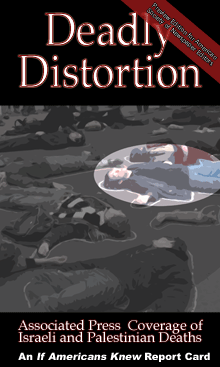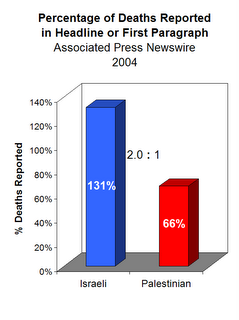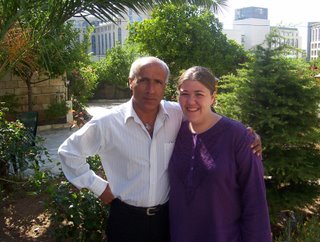It's hard to know what to say on Nakba day. This is the day that Palestinians remember the way that so many of them were violently expelled from their homes at the founding of the state of Israel. They remember life 58 years ago, before ethnic cleaning and occupation.
The Nakba is daunting. I feel unable to really speak about it in a way that does the subject justice. But I feel as though something must be said. It is the denial of the Nakba (which is Arabic for catastrophe) that gives Israel "moral authority" in the eyes of the world. If we were to face the way that state of Israel was founded, we would come to see this "conflict" in a total different way.
But that's enough of me. I will try to find some more information and resources to share about this important topic, but that's for another day. Right now, I want to try to talk about the Nakba from a different angle.
I got this email quite a while ago from Hannah, who I lived with in the International Women's Peace Service house. She's doing some pretty amazing things right now. First, she's running a travel program for other Jewish young people called Birthright Unplugged. This gives Jewish people a chance to travel to the West Bank and see the occupation for themselves. Please help spread the word about this work. Secondly, she's running a program called "Birthright Re-plugged." It's very special. Let me let her tell you about it:
_______________
Our Re-plugged trips with children living in a West Bank refugee camp complement our Unplugged trips described above. As Jewish people, the participants on our Unplugged trips have an open invitation by the Israeli government to move to a nation that has been superimposed on the lands of displaced people. These displaced people, Palestinian refugees, are denied their internationally recognized right to return to their land. Strict movement restrictions require Palestinians to obtain permits for themselves and their cars if they want to move from place to place. Most Palestinian people do not have these permits and are unable to enter Israel, which for refugees means they cannot even visit the villages they were expelled from in 1948. Israel controls Palestinian movement through the ID card system, which begins at age 16 for Palestinian people. Until that age, children are able to move with fewer constraints, but rarely do because their parents, grandparents, and older siblings are unable to do so. This is where we come in. As internationals with foreign passports, we can move with relative freedom, and we can escort the children our of their refugee camp in the West Bank, through checkpoints, and to the places they always talk about but are rarely able to visit.
We ran two Re-plugged trips, one for 8 girls and one for 8 boys. Some of the most moving experiences we had with the children included their first sight of the sea, discovering their ancestral villages and connecting with
the land, and seeing their community come together to share and celebrate during the exhibit.
The girls trip was first, and we had not emphasized the importance of bringing towels and changes of clothing. When we arrived at the sea, the girls ran straight into the water, despite the mid-January weather. They played, danced, and ran around for an hour or two, and came out of the water soaking wet. At this point, they realized they would have to share towels, and many of the girls had to wear pajamas for the rest of the day, not
having any dry clothes.
The host families they met later, through the Yaffa-based Palestinian organization Al-Rabita, took good care of them and their wet clothes. Many of the children do not know Palestinian people who live inside Israel, and
vice versa, since Israeli travel restrictions prevent West Bank Palestinians from entering Israel and Israeli citizens from entering Areas "A" (or urban centers) of the West Bank and Gaza Strip. The experience was moving for
both parties, and the kids invited their host families to the exhibit in Dheisheh two weeks later.
Most profound for all the children was experiencing the villages they have heard their grandparents talk about since they were born. The boys ran around picking flowers and plants for each other, rolling around on the
land, and kissing the earth they have never touched before. The girls dressed in traditional embroidered dresses in preparation for the visit. In one village, they climbed the minaret of the mosque that still stands amidst
a newly built Jewish Israeli community, its prayer space now filled with trash. In another village, they ran up a hillside to find the remains of their grandparents houses, old water wells, and olive and fig trees
probably planted by their ancestors. Their exuberance at discovering these things turned into a kind of hysteria as they laughed and screamed, and then decided they wanted to stay and sleep on the land, refusing to leave.
We finally boarded the van to return to the camp, the girls still angry and upset about what they had seen and having to be pulled away from it. Our driver, Rimon, tried to appease the girls with, "Next time weÂ’ll stay
longer." Twelve-year-old Lana responded: "There is no next time. You know that, and we know that. WeÂ’re going back to Dheisheh now and we will die in Dheisheh."
We had anticipated painful moments like this, and in preparation for the program, had spoken with people who had gone to their villages as children. We were assured that the kids would carry this once-in-a-lifetime experience with them always, making it well worth it. The organizations we worked with in Dheisheh camp, Shiraa’ and Ibdaa’, also had follow-up meetings with the children, helping to support them upon their return.
After the trip, we helped the children curate an exhibit of their photographs and objects they had collected. The planning and carrying out of the exhibit gave the children the opportunity to reflect on their
experiences, as well as a way to make a tangible contribution to the collective memory in the camp, where the photographs still hang.
_______________
Chech out more information on the project at
www.birthrightunplugged.org


 Accouncing the results of many, many hours of hard work...
Accouncing the results of many, many hours of hard work... and grizzly, as it sounds. But the results were interesting...to say the least.
and grizzly, as it sounds. But the results were interesting...to say the least.
 This is Dedicated:
This is Dedicated: